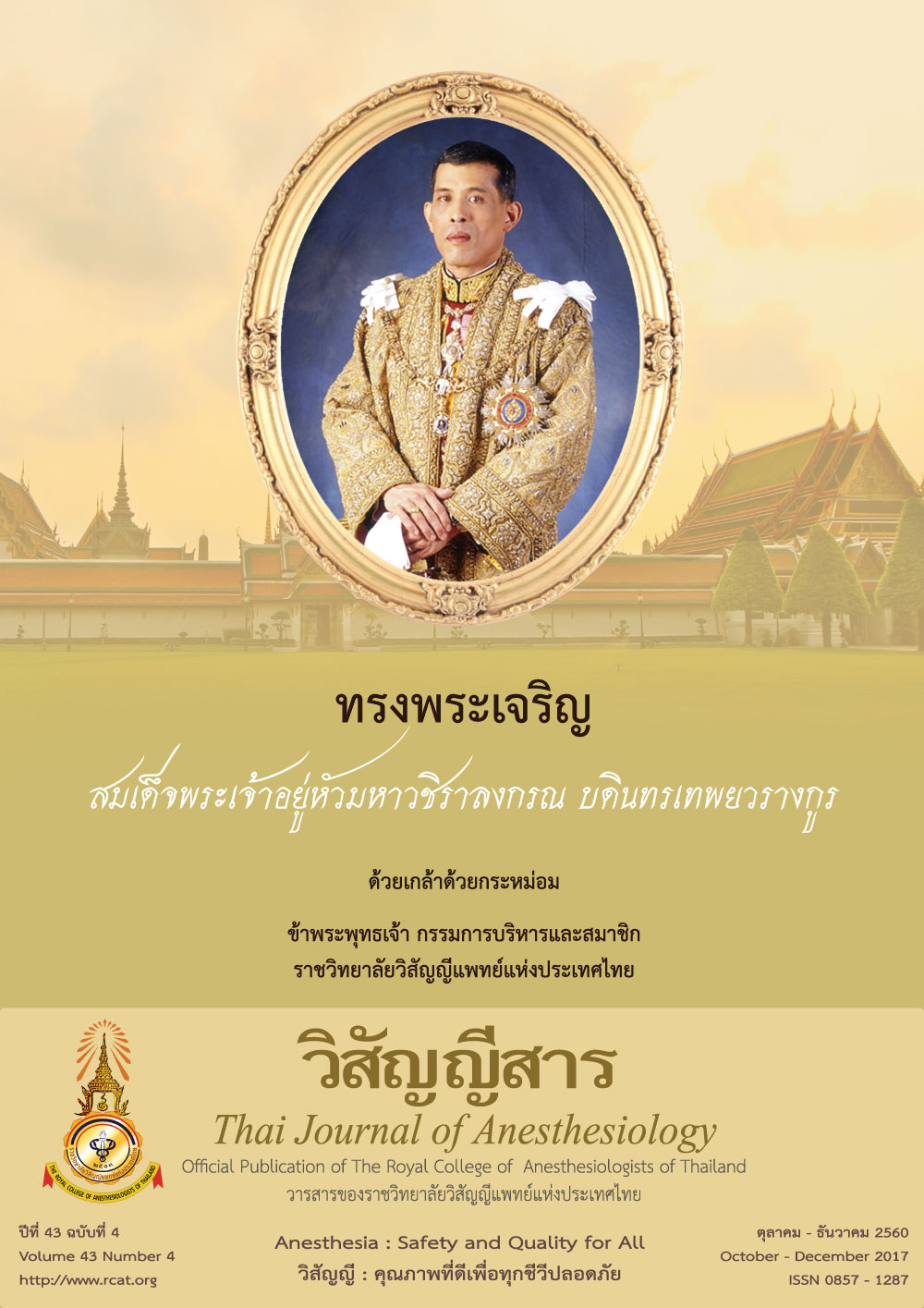A comparison of blood pressure reduction after propofol lnduction in elderly between overnight fasting and 2-hour fasting of clear liquids: prospective single-blinded randomized controlled trial
Main Article Content
Abstract
esthesiologist guidelines have recommended at
least 2 hours of clear fluids abstinence prior to
elective procedures requiring general anesthesia in
adults. Practically, all patients are prescribed to have
nothing per oral after midnight for both solids and
clear fluids. This unpredictably prolonged fasting
time leads to dehydration and exaggerates hypotension
during an induction of general anesthesia especially in
elderly patients. We hypothesized that the reduction
of blood pressure after propofol induction is lower
in patients allowed to drink water until 2 hours prior
to surgery comparing to routinely-fasted patients.
Methods: One hundred ASA II-III patients aged over
65 years were preoperatively randomized to have last
clear fluids before midnight (AMN; control group,
n=50) and at least 2 hours before a scheduled surgery
time (2-hour; study group, n=50). Intravenous fluid was
started at 6.00 am. and infused at a weight-based rate.
Propofol was administered at a rate of 1 mg/kg/min.
The primary outcome was a reduction of blood
pressure after induction. Results: There were no
differences in a blood pressure reduction at any times
after induction (24.20±18.03 vs 24.12±20.36 mmHg,
p-value=0.983). Eight patients in 2-hour group did not
drink anything after midnight. As per-protocol analysis
(AMN; n=58, 2-hour; n=42), the decrease of blood
pressure was not different (p-value=0.811). The
2-hour group had significantly higher percentage of
the patients with no perception of thirst (p-value
=0.003). Moreover, estimating relations between
variables using Quantile regression method, we found
two factors, a higher dose of propofol and a lower total
volume received including orally and intravenously,
associated with a larger reduction of blood pressure
(p-value=0.043, and 0.042, respectively). Conclusions:
Two-hour clear fluids fasting patients had an
insignificant difference in blood pressure reduction
after induction of anesthesia with propofol comparing
to traditional overnight fasting. However, the thirst
perception was less in 2-hour group.
Article Details
References
guidelines for preoperative fasting and the use of
pharmacologic agents to reduce the risk of pulmonary
aspiration: application to healthy patients undergoing
elective procedures: a report by the American Society
Anesthesiology. 1999;90(3):896-905.
2. American Society of Anesthesiologists. Practice guidelines
for preoperative fasting and the use of pharmacologic
agents to reduce the risk of pulmonary aspiration:
application to healthy patients undergoing elective
procedures: an updated report by the American Society of
Anesthesiologists Committee on Standards and Practice
Parameters. Anesthesiology. 2011;114(3):495-511.
3. Martay K, Vater Y, Hunter C, Ross B. Preoperative
fasting after soft drink intake: 2 hours may be enough.
J Anesth. 2002;16(2):179-80.
4. Shime N, Ono A, Chihara E, Tanaka Y. Current practice
of preoperative fasting: a nationwide survey in Japanese
anesthesia-teaching hospitals. J Anesth. 2005;19(3):
187-92.
5. Holte K, Kehlet H. Compensatory fluid administration
for preoperative dehydration--does it improve outcome?
Acta Anaesth Scand. 2002;46(9):1089-93.
6. Hug CC, Jr., McLeskey CH, Nahrwold ML, Roizen MF,
Stanley TH, Thisted RA, et al. Hemodynamic effects of
propofol: data from over 25,000 patients. Anesth Analg.
1993;77(4 Suppl):S21-9.
7. Kanonidou Z, Karystianou G. Anesthesia for the elderly.
Hippokratia. 2007;11(4):175-7.
8. Reich DL, Hossain S, Krol M, Baez B, Patel P, Bernstein A,
et al. Predictors of hypotension after induction of general
anesthesia. Anesth Analg. 2005;101(3):622-8.
9. Hausel J, Nygren J, Lagerkranser M, Hellstrom PM,
Hammarqvist F, Almstrom C, et al. A carbohydrate-rich
drink reduces preoperative discomfort in elective surgery
patients. Anesth Analg. 2001;93(5):1344-50.
10. Power S, Kavanagh DO, McConnell G, Cronin K, Corish C,
Leonard M, et al. Reducing preoperative fasting in
elective adult surgical patients: a case-control study.
Irish J Med Sci. 2012;181(1):99-104.
11. Holliday MA, Segar WE. The maintenance need for
water in parenteral fluid therapy. Pediatrics. 1957;
19(5):823-32.
12. Shafer SL. Advances in propofol pharmacokinetics
and pharmacodynamics. J Clin Anesth. 1993;5(6 Suppl 1):
14S-21S.
13. Taniguchi H, Sasaki T, Fujita H. Preoperative
management of surgical patients by “shortened fasting
time”: a study on the amount of total body water by
multi-frequency impedance method. Int J Med Sci.
2012;9(7):567-74.
14. Madsen M, Brosnan J, Nagy VT. Perioperative thirst: a
patient perspective. J Perianesth Nurs 1998;13(4):225-8.
15. Bopp C, Hofer S, Klein A, Weigand MA, Martin E,
Gust R. A liberal preoperative fasting regimen
improves patient comfort and satisfaction with
anesthesia care in day-stay minor surgery. Minerva
Anestesiol. 2011;77(7):680-6.
16. Ljungqvist O, Scott M, Fearon KC. Enhanced recovery
after surgery: a review. JAMA Surg. 2017;152(3):292-8.
17. Carmichael JC, Keller DS, Baldini G, Bordeianou L,
Weiss E, Lee L, et al. Clinical practice guidelines for
enhanced recovery after colon and rectal surgery from
the American Society of Colon and Rectal Surgeons and
Society of American Gastrointestinal and Endoscopic
Surgeons. Dis Colon Rectum. 2017;60(8):761-84.
18. Nygren J, Thorell A, Ljungqvist O. Are there any
benefits from minimizing fasting and optimization of
nutrition and fluid management for patients undergoing
day surgery? Curr Opin Anaesthesiol. 2007;20(6):540-4.
19. Watson K, Rinomhota S. Preoperative fasting: we need
a new consensus. Nurs Times. 2002;98(15):36-7.


